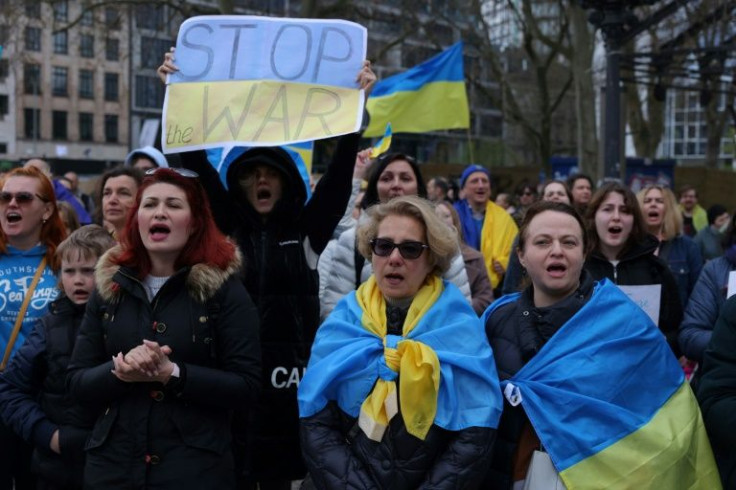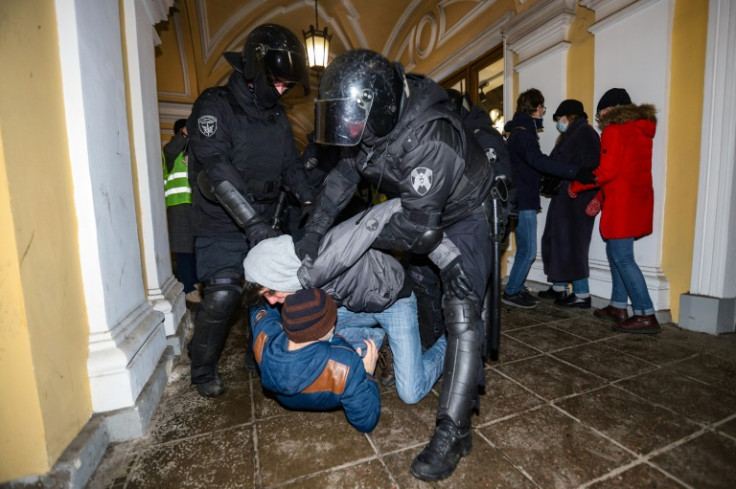Russian Journalist Charged With 'Discrediting' Army For Saying Friendship Is 'Stronger Than War'

KEY POINTS
- A Russian journalist has been charged with "discrediting" the Russian army
- She said she got a tattoo that says "love and friendship are stronger than war"
- A hearing for the journalist's case has been adjourned until Feb. 28
A Russian journalist who has been organizing aid for Ukrainian refugees was accused of "discrediting" her country's military because of a tattoo, according to reports.
Moscow's Tverskoy District Court received a case under Article 20.3.3 of Russia's Code of Administrative Offences against Yulia Starostina, a former correspondent for independent Russian media outlets The Bell and Proekt.
Under the supplementary article that was signed into law by Russian President Vladimir Putin in March last year, individuals can be penalized with administrative fines for "discrediting" Russia's military.
The case was filed over comments Starostina made in an interview with the channel Dozhd, also known as TV Rain. She said she got a tattoo of the phrase "love and friendship are stronger than war," according to the independent Russian publication Agentstvo, which obtained a copy of the case.
The phrase was reportedly considered "discrediting" the Russian army.
Starostina said she got the tattoo to remember that "love is stronger than war, that friendship is stronger than war, that warmth is stronger than war and that war is not really the most powerful thing in the world."
An inspector from Russia's Ministry of Internal Affairs also claimed that several other statements Starostina made in the interview fell under the same offense.
These statements included, "I have no relatives in Ukraine, but I feel a responsibility not to be silent, to do something to bring this war to an end," and "Russia is still a foreign country [for refugees]," according to Agentstvo.
Starostina, who also worked for the RBC media group in the past, has reportedly been helping refugees from Ukraine by collecting humanitarian aid and taking people to temporary shelters.
A hearing for her case has been adjourned until Feb. 28 in order to obtain evidence, according to the Tverskoy District Court.
In a similar story, a court in Russia's western Tula region fined a local DJ after he played a song by a Ukrainian music act in a club during Putin's most recent New Year address.
Tula's Novomoskovsky District Court imposed a 40,000-ruble ($540) penalty against Sergey Vasiliev after he was found guilty of "discrediting" the Russian Armed Forces, according to a court order dated Friday.
While providing musical accompaniment for an event held at the Flagman bar in Novomoskovsky's administrative capital on Dec. 31, 2022, Vasiliev reportedly played the song "New Year" by the Ukrainian duo Potap & Nastya.
The track was played in the presence of visitors through the establishment's audio system at the same time Putin delivered his televised New Year address, Novomoskovsky District Court claimed.
A case under Article 20.3.3 of Russia's Code of Administrative Offences was filed against Vasiliev following the incident.
Vasiliev pleaded not guilty in his case, but Novomoskovsky District Court found that his actions "undermined the confidence" of Russia's invasion of Ukraine that began nearly a year ago, according to Tula's judicial press service.

© Copyright IBTimes 2024. All rights reserved.





















